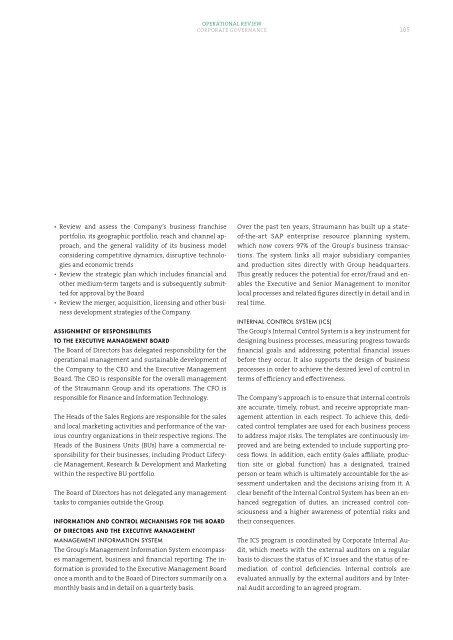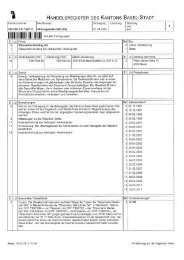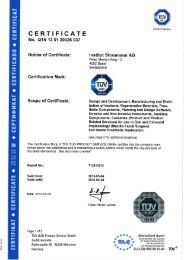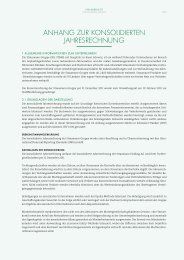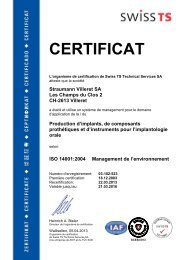Full corporate governance report 2011 - Straumann
Full corporate governance report 2011 - Straumann
Full corporate governance report 2011 - Straumann
Create successful ePaper yourself
Turn your PDF publications into a flip-book with our unique Google optimized e-Paper software.
operational review<br />
<strong>corporate</strong> <strong>governance</strong> 105<br />
• Review and assess the Company’s business franchise<br />
portfolio, its geographic portfolio, reach and channel approach,<br />
and the general validity of its business model<br />
considering competitive dynamics, disruptive technologies<br />
and economic trends<br />
• Review the strategic plan which includes financial and<br />
other medium-term targets and is subsequently submitted<br />
for approval by the Board<br />
• Review the merger, acquisition, licensing and other business<br />
development strategies of the Company.<br />
ASSIGNMENT OF RESPONSIBILITIES<br />
TO THE EXECUTIVE MANAGEMENT BOARD<br />
The Board of Directors has delegated responsibility for the<br />
operational management and sustainable development of<br />
the Company to the CEO and the Executive Management<br />
Board. The CEO is responsible for the overall management<br />
of the <strong>Straumann</strong> Group and its operations. The CFO is<br />
responsible for Finance and Information Technology.<br />
The Heads of the Sales Regions are responsible for the sales<br />
and local marketing activities and performance of the various<br />
country organizations in their respective regions. The<br />
Heads of the Business Units (BUs) have a commercial responsibility<br />
for their businesses, including Product Lifecycle<br />
Management, Research & Development and Marketing<br />
within the respective BU portfolio.<br />
The Board of Directors has not delegated any management<br />
tasks to companies outside the Group.<br />
INFORMATION AND CONTROL MECHANISMS FOR THE BOARD<br />
OF DIRECTORS AND THE EXECUTIVE MANAGEMENT<br />
MANAGEMENT INFORMATION SYSTEM<br />
The Group’s Management Information System encompasses<br />
management, business and financial <strong>report</strong>ing. The information<br />
is provided to the Executive Management Board<br />
once a month and to the Board of Directors summarily on a<br />
monthly basis and in detail on a quarterly basis.<br />
Over the past ten years, <strong>Straumann</strong> has built up a stateof-the-art<br />
SAP enterprise resource planning system,<br />
which now covers 97% of the Group’s business transactions.<br />
The system links all major subsidiary companies<br />
and production sites directly with Group headquarters.<br />
This greatly reduces the potential for error/fraud and enables<br />
the Executive and Senior Management to monitor<br />
local processes and related figures directly in detail and in<br />
real time.<br />
INTERNAL CONTROL SYSTEM (ICS)<br />
The Group’s Internal Control System is a key instrument for<br />
designing business processes, measuring progress towards<br />
financial goals and addressing potential financial issues<br />
before they occur. It also supports the design of business<br />
processes in order to achieve the desired level of control in<br />
terms of efficiency and effectiveness.<br />
The Company’s approach is to ensure that internal controls<br />
are accurate, timely, robust, and receive appropriate management<br />
attention in each respect. To achieve this, dedicated<br />
control templates are used for each business process<br />
to address major risks. The templates are continuously improved<br />
and are being extended to include supporting process<br />
flows. In addition, each entity (sales affiliate, production<br />
site or global function) has a designated, trained<br />
person or team which is ultimately accountable for the assessment<br />
undertaken and the decisions arising from it. A<br />
clear benefit of the Internal Control System has been an enhanced<br />
segregation of duties, an increased control consciousness<br />
and a higher awareness of potential risks and<br />
their consequences.<br />
The ICS program is coordinated by Corporate Internal Audit,<br />
which meets with the external auditors on a regular<br />
basis to discuss the status of IC issues and the status of remediation<br />
of control deficiencies. Internal controls are<br />
evaluated annually by the external auditors and by Internal<br />
Audit according to an agreed program.


